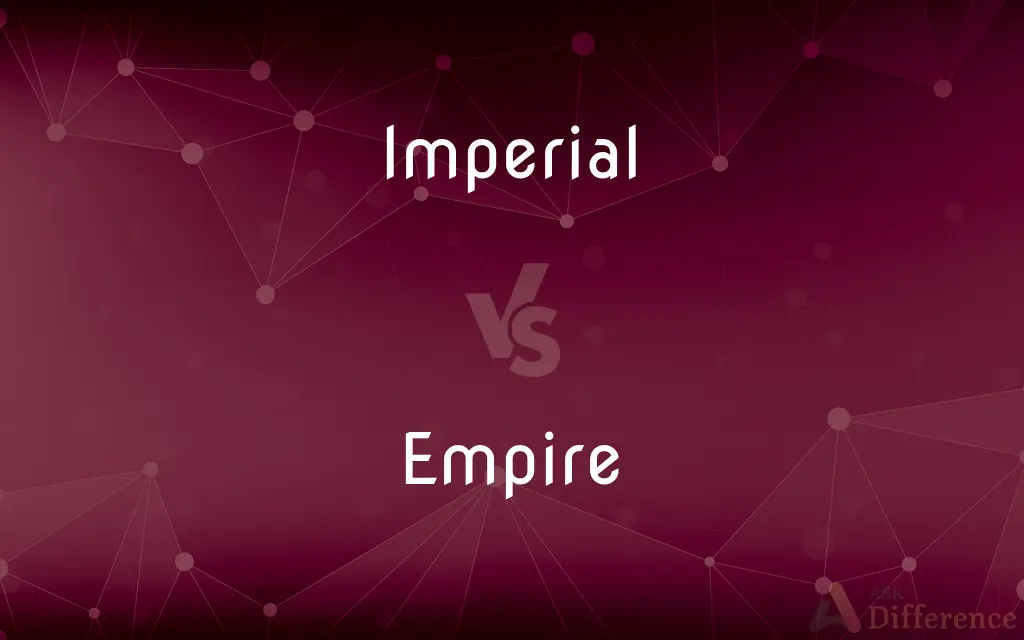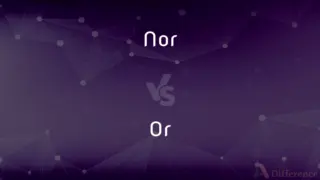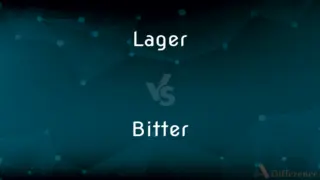Imperial vs. Empire — What's the Difference?
By Fiza Rafique & Urooj Arif — Updated on March 18, 2024
Imperial relates to an empire or its ruler, emphasizing authority or power, while an empire denotes a large political unit under a single sovereign.

Difference Between Imperial and Empire
Table of Contents
ADVERTISEMENT
Key Differences
Imperial pertains to the ruling authority of an empire or its characteristics. An empire, on the other hand, refers to a vast geopolitical entity.
Imperial highlighting aspects such as governance, expansion, or the supreme authority of an emperor or empress. Empire often spanning multiple territories or nations, governed by a single sovereign authority, typically an emperor or empress.
For instance, the term "imperial" can describe the policies, decrees, or possessions directly associated with the emperor of an empire. The term empire is characterized by its extensive size, diversity of cultures and peoples under its control, and the centralization of political power.
Imperial embodies the concept of centralized power and authority, often associated with expansionist policies and a hierarchical social structure. Empires are historically noted for their role in facilitating trade, cultural exchange, and the spread of various religious and social practices.
Comparison Chart
Definition
Relating to an emperor or empire, emphasizing authority.
A vast sovereign political structure under a single ruler.
ADVERTISEMENT
Focus
Authority, governance, and policies of an empire.
The geopolitical entity itself, its size, and governance.
Representation
Symbolizes power and authority of the ruling entity.
Represents the physical and political expanse under control.
Usage
Descriptive of actions, policies, or possessions of an empire.
Refers to the entire political entity.
Context
Often used in relation to the administration or governance.
Used to discuss the geographical and political scope.
Compare with Definitions
Imperial
Pertaining to an emperor or empire.
The imperial decree mandated reforms throughout the territory.
Empire
Encompassing diverse territories and cultures.
The empire’s vastness included many languages and cultures.
Imperial
Relating to the strategic decisions made by an empire.
Imperial policies focused on expanding the empire’s borders.
Empire
A large political unit under a single sovereign.
The Roman Empire was one of the most powerful states in ancient history.
Imperial
Reflecting the centralized authority of an empire.
The imperial administration was known for its strict hierarchy.
Empire
Growth in territory, influence, and power.
The empire expanded its borders through military conquests.
Imperial
Items or territories owned or controlled by an empire.
The imperial crown jewels were symbols of absolute power.
Empire
Centralized control over its constituent regions.
The empire was governed from the capital, where the emperor resided.
Imperial
Of, relating to, or suggestive of an empire or a sovereign, especially an emperor or empress
Imperial rule.
The imperial palace.
Empire
A melting pot of different traditions and practices.
The empire’s cultural influence spread through trade and conquest.
Imperial
Associated with the might and dignity of an empire.
The eagle is often an imperial symbol representing strength and unity.
Empire
An empire is a sovereign state made up of several territories and peoples subject to a single ruling authority, often an emperor. A state can become an empire either by a narrow definition through having an emperor and being named as such, or by a broad definition as stated above as an aggregate territory under the rule of supreme authorities such as the Roman Empire.
Imperial
Ruling over extensive territories or over colonies or dependencies
Imperial nations.
Empire
An extensive group of states or countries ruled over by a single monarch, an oligarchy, or a sovereign state
The Roman Empire
Imperial
Having supreme authority; sovereign.
Empire
A large commercial organization owned or controlled by one person or group
Her business empire grew
Imperial
Regal; majestic.
Empire
Denoting a style of furniture, decoration, or dress fashionable chiefly during the First Empire in France. The decorative style was neoclassical but marked by an interest in Egyptian and other ancient motifs.
Imperial
Outstanding in size or quality.
Empire
Denoting produce from the Commonwealth.
Imperial
Of or belonging to the British Imperial System of weights and measures.
Empire
Of, relating to, or characteristic of a neoclassic style, as in clothing or the decorative arts, prevalent in France during the early 1800s.
Imperial
An emperor or empress.
Empire
A variety of apple having dark red skin and white flesh.
Imperial
The top of a carriage.
Empire
A political unit having an extensive territory or comprising a number of territories or nations and ruled by a single supreme authority.
Imperial
Something outstanding in size or quality.
Empire
The territory included in such a unit.
Imperial
A variable size of paper, usually 23 by 33 inches (55.8 by 83.8 centimeters).
Empire
An extensive enterprise under a unified authority:a publishing empire.
Imperial
A pointed beard grown from the lower lip and chin.
Empire
Imperial or imperialistic sovereignty, domination, or control:the extension of empire to distant lands.
Imperial
Related to an empire, emperor, or empress.
Empire
A political unit, typically having an extensive territory or comprising a number of territories or nations (especially one comprising one or more kingdoms) and ruled by a single supreme authority.
The Russian empire
Imperial
Relating to the British imperial system of measurement.
Empire
A political unit ruled by an emperor or empress.
The Empire of Vietnam was a short-lived client state of Japan governing Vietnam between March 11 and August 23, 1945.
Imperial
Very grand or fine.
Empire
The group of states or other territories that owe allegiance to an imperial power (foreign to them), when distinguished from the native territory of that power; imperial possessions.
Imperial
Of special, superior, or unusual size or excellence.
Empire
An expansive and powerful enterprise under the control of one person or group.
The McDonald's fast food empire
Imperial
A bottle of wine (usually Bordeaux) containing 6 liters of fluid, eight times the volume of a standard bottle.
Empire
(Absolute) control, dominion, sway.
Imperial
A writing paper size measuring 30 × 22 inches, or printing paper measuring 32 × 22 inches.
Empire
Alternative case form of Empire.
Imperial
A card game differing from piquet in some minor details, and in having a trump.
Empire
Supreme power; sovereignty; sway; dominion.
Over hell extendHis empire, and with iron scepter rule.
Imperial
Any of several combinations of cards which score in this game.
Empire
The dominion of an emperor; the territory or countries under the jurisdiction and dominion of an emperor (rarely of a king), usually of greater extent than a kingdom, always comprising a variety in the nationality of, or the forms of administration in, constituent and subordinate portions; as, the Austrian empire.
Empire carries with it the idea of a vast and complicated government.
Imperial
A crown imperial.
Empire
Any dominion; supreme control; governing influence; rule; sway; as, the empire of mind or of reason.
Another force which, in the Middle Ages, shared with chivalry the empire over the minds of men.
Imperial
A tuft of hair on the lower lip (so called from its use by Napoleon III).
Empire
The domain ruled by an emperor or empress
Imperial
A kind of dome, as in Moorish buildings.
Empire
A group of countries under a single authority;
The British empire
Imperial
(historical) An outside seat on a diligence or carriage.
Empire
A monarchy with an emperor as head of state
Imperial
A variety of green tea.
Empire
A group of diverse companies under common ownership and run as a single organization
Imperial
Of or pertaining to an empire, or to an emperor; as, an imperial government; imperial authority or edict.
The lastThat wore the imperial diadem of Rome.
Empire
An eating apple that somewhat resembles a McIntosh; used as both an eating and a cooking apple
Imperial
Belonging to, or suitable to, supreme authority, or one who wields it; royal; sovereign; supreme.
Who, as Ulysses says, opinion crownsWith an imperial voice.
To tame the proud, the fetter'd slave to free,These are imperial arts, and worthy thee.
He sounds his imperial clarion along the whole line of battle.
Imperial
Of superior or unusual size or excellence; as, imperial paper; imperial tea, etc.
Imperial
The tuft of hair on a man's lower lip and chin; - so called from the style of beard of Napoleon III.
Imperial
An outside seat on a diligence.
Imperial
A luggage case on the top of a coach.
Imperial
Anything of unusual size or excellence, as a large decanter, a kind of large photograph, a large sheet of drawing, printing, or writing paper, etc.
Imperial
A gold coin of Russia worth ten rubles, or about eight dollars.
Imperial
A kind of fine cloth brought into England from Greece. or other Eastern countries, in the Middle Ages.
Imperial
A game at cards differing from piquet in some minor details, and in having a trump; also, any one of several combinations of cards which score in this game.
Imperial
A small tufted beard worn by Emperor Napoleon III
Imperial
A piece of luggage carried on top of a coach
Imperial
Relating to or associated with an empire;
Imperial colony
The imperial gallon was standardized legally throughout the British Empire
Imperial
Befitting or belonging to an emperor or empress;
Imperial palace
Imperial
Belonging to or befitting a supreme ruler;
Golden age of imperial splendor
Purple tyrant
Regal attire
Treated with royal acclaim
The royal carriage of a stag's head
Common Curiosities
How does an empire expand its territories?
An empire expands its territories through conquest, diplomacy, and sometimes through marriage alliances.
What is the difference between imperial and colonial?
Imperial refers to matters relating to an emperor or empire, while colonial pertains to the colonization or control of one country by another.
What role do imperial symbols play?
Imperial symbols, like flags or crests, play roles in representing authority, unity, and the identity of an empire.
What defines an imperial government?
An imperial government is defined by its centralized authority and governance system, typically under an emperor or empress.
Are all empires imperial?
Yes, by definition, empires are imperial because they are governed by a central authority in a hierarchical system.
Can a country be imperial without being an empire?
Yes, a country can adopt imperial policies or attitudes, such as expansionism, without technically being an empire.
How do imperial policies affect subject territories?
Imperial policies can lead to cultural assimilation, economic exploitation, and sometimes resistance or rebellion in subject territories.
Was the Roman Empire an imperial state?
Yes, the Roman Empire was an imperial state with centralized authority under emperors.
Do modern states follow imperial models?
Some modern states may exhibit imperial characteristics, such as expansionist policies or central authority, but true empires are rare today.
What is an example of an imperial decree?
An imperial decree might involve the proclamation of a new law or the annexation of a new territory.
What happens when an empire collapses?
The collapse of an empire often leads to political fragmentation, the emergence of new states, and sometimes chaos and conflict.
Can an empire exist without an emperor?
While traditionally empires are ruled by emperors, the term can also refer to large sovereign states under a single authority, not necessarily an emperor.
How did empires impact global history?
Empires have significantly impacted global history through the spread of cultures, languages, religions, and technological innovations.
How does imperialism differ from imperialism?
This question seems to contain a typo, as it compares the same term. If meant to compare imperialism with colonialism, imperialism is a broader concept involving empire-building and dominance, while colonialism specifically refers to settling and exploiting colonies.
What distinguishes an empire from a kingdom?
An empire often encompasses multiple territories or peoples and is larger and more diverse than a kingdom, which is usually a single territory under a monarch.
Share Your Discovery

Previous Comparison
Nor vs. Or
Next Comparison
Lager vs. BitterAuthor Spotlight
Written by
Fiza RafiqueFiza Rafique is a skilled content writer at AskDifference.com, where she meticulously refines and enhances written pieces. Drawing from her vast editorial expertise, Fiza ensures clarity, accuracy, and precision in every article. Passionate about language, she continually seeks to elevate the quality of content for readers worldwide.
Co-written by
Urooj ArifUrooj is a skilled content writer at Ask Difference, known for her exceptional ability to simplify complex topics into engaging and informative content. With a passion for research and a flair for clear, concise writing, she consistently delivers articles that resonate with our diverse audience.














































